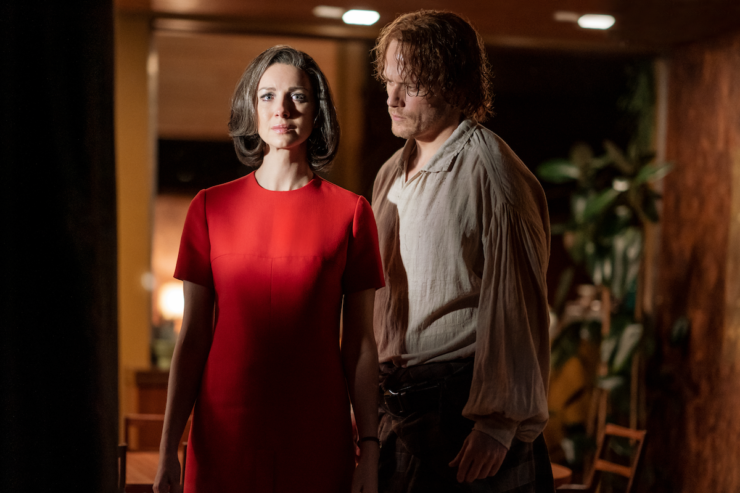All season I’ve been poised, waiting for the consequences for Dr. Claire Beauchamp Randall Fraser meddling with history to become clear—for some universal punishment visited upon her for trying to impose any modern hindsight upon the past. But the brutal attack that takes place in the Outlander season 5 finale feels much more personal than any laws of timeline continuity: Claire doesn’t suffer because she’s a time traveler, but rather because she’s a woman.
Spoilers for Outlander 5×12 “Never My Love.” Content warning for discussions of sexual assault.
Because rape is such a part of Outlander’s narrative bloodline, there’s always been an odd sense that Claire couldn’t outrun it forever, that at some point she would join the ranks of characters who had been brutalized by another. This is not to disregard the fact that Claire has already had sex against her will in season 2, when King Louis XIV fucks her in exchange for Jamie’s freedom in France despite the fact that she does not want to do it. However, she had thus far escaped the awful fates that had befallen both Jamie and her daughter Brianna—the experience of sexual assault as a show of power, as a way of reducing the other person to an object to be used.
When it finally happens to Claire, the assault occurs at the hands of Lionel Brown and his men in a horrific gang rape. For him, it’s revenge for her medical advice pamphlets, written as Dr. Rawlings, educating local women of the time in methods of contraception that give them enough agency in the bedroom to not have sex with their husbands at certain times of the month, i.e., for Lionel’s abused wife to not constantly be available to him. Kidnapping Claire in last week’s episode “Journeycake” and dragging her along to Brownsville, beating and stabbing her, then raping her while she’s bound and helpless, is Lionel’s way of violently putting her in her place, reminding her what it means to be a woman in the 1700s. For the rest of his men who follow his example, it’s simply because she’s there.
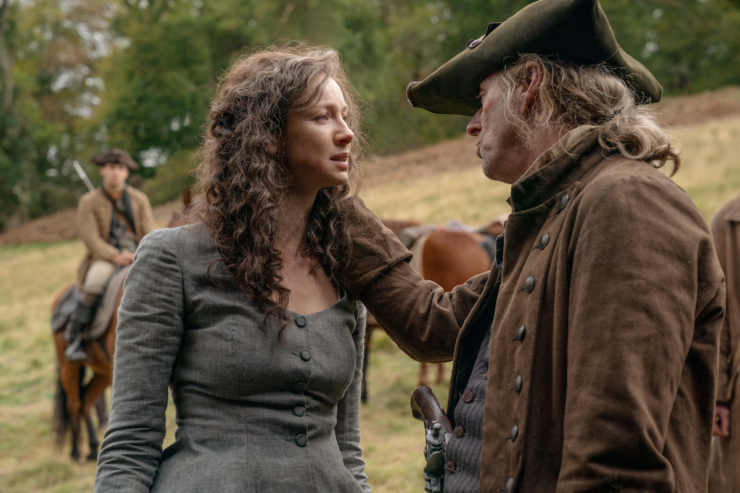
For the most part, Claire retreats into a dream sequence as a coping mechanism: Thanksgiving dinner in the 1960s, surrounded by her 18th-century family all in modern garb. Even without the context of the rape, it’s a bittersweet fantasy, as Murtaugh is dead and all of them are incapable of passing through the stones; the vision of them around the table that Claire longs for is impossible. But seeing Murtaugh in a turtleneck, Ian in a soldier’s uniform, Marsali with bangs, Fergus with both hands—it’s a way for Claire to gather everyone beloved to her close, to draw strength from their presence even if it’s just in her head.
Everyone, that is, except for Roger and Brianna, who in her dream wind up in a car accident that kills them and little Jemmy. No doubt this is Claire’s subconscious puncturing her dissociative state, reminding her that she will never know her family’s fate once they passed through the stones to return to the present; she will never know how the rest of their lives unspooled. (More on that later.)
The only person not dressed for the ’60s is Jamie; in fact, he has reverted back to his season 1 self, all tousled hair and half-open shirt, the Highlander fantasy. He even wraps Claire in a tartan blanket in a parallel to their first moments together twenty-odd years ago: her out of her element and in shock, him grounding her.
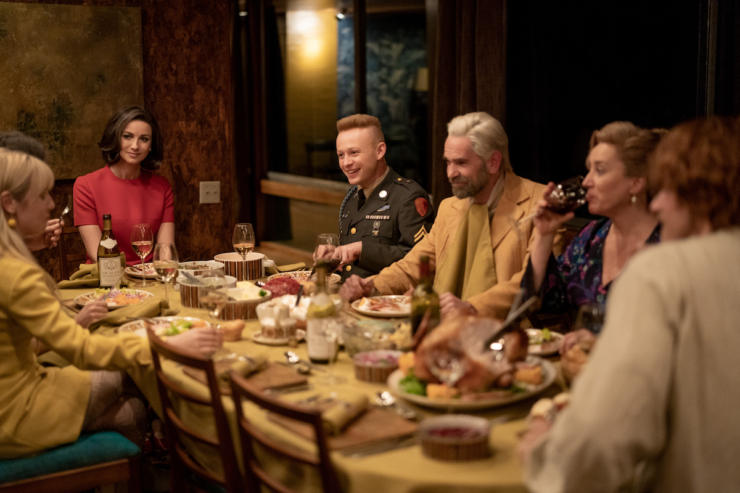
That Claire drifts through this sequence without speaking—aside from “No” and “Jamie”—is at first off-putting. With her ’60s coiffure and matching red dress and nails, she looks like a vacant housewife, with nothing of the courageous doctor presiding over battlefields and in her home surgery. Yet once Caitriona Balfe (who, it should go without saying, acted the hell out of this whole episode) provided more context in an interview with The New York Times, it made more sense: While earlier drafts had her inhabiting the dreamscape the way the others were, it ultimately didn’t make sense for her to be talking about Thanksgiving dinner in that moment. Instead, Balfe explained, those two utterances are “her grasping onto moments in her life that make her safe and comforted.”
Then there’s the orange. Execute producer Toni Graphia, who cowrote the episode with showrunner Matthew B. Roberts, explained to Elle how the symbol was a callback to Claire’s nonconsensual sex in season 2: “After Claire sleeps with the King of France to save Jamie’s life, when she leaves Versailles Palace, the last thing she does is pick up the orange and take it with her. It was a small gesture by Claire, a choice that symbolizes that she’s leaving with her dignity.” Later in this finale, when confronted with the opportunity to kill Lionel on her operating table, Claire flashes back to that orange and picks it up—an indication, Graphia said, of her taking the high road: “She’s got a piece of herself that no one can ever take from her.”
That sentiment is what the episode builds to, the depiction of Claire’s personhood being violently taken away ultimately as secondary to how much of her self she retains by the end. I’m reluctant to linger on the rape because that’s not the entirety of the story, but neither do I want to dismiss it as just par for the course for an 18th-century woman (or a woman of any century, really). Grimly unsurprising as it was, it was nonetheless so difficult to watch.
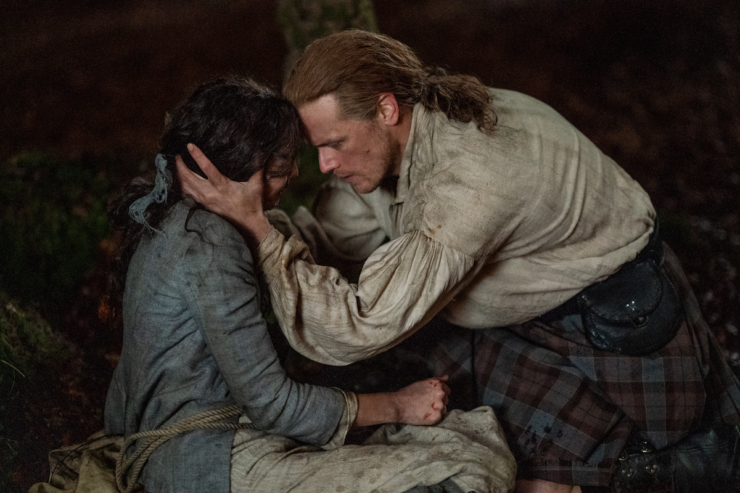
What I do want to give a moment to, before moving on to the Fraser clan’s bloody revenge, is the introduction of Wendigo Donner. Claire meets another time traveler! Wendigo is part of the Montauk Five, a group of Native American activists who traveled back in time in 1968 in an effort to save their ancestors from white colonizers. Another member of that group was Robert Springer, a.k.a. Otter Tooth, a.k.a. the owner of the opal that Jemmy breaks as a sign that he can travel.
Wendigo realizes that Claire is like him when she shouts out her signature “Jesus H. Roosevelt Christ!” at Lionel’s men, and he approaches her while the others are clustered around the fire—before the gang rape. Despite her promise to provide him with gemstones to return to the future, Wendigo is too scared to go against Lionel, saying that he’d kill him for betraying him. Even as Claire begs him to free her, Wendigo is coldly pragmatic that the risk is not worth the reward. Even more chilling are his final words to Claire as he replaces her gag: “You should be more afraid”—more like a woman of the time would act.
And then he slips away anyway, so that he is neither part of the group that violates Claire nor one of the victims of clan Fraser’s attack and retribution. No doubt he’ll return in some form next season; maybe to claim that he had run off to get Claire help, or to follow up on those promised gemstones. But when Jamie later asks if he was part of the crew who attacked her, Claire’s response says everything:
“Did he harm you?”
“He didn’t help me.”
As time travelers go, Wendigo seems a lot saner (and less bloodthirsty) than Geillis Duncan, but at least she sacrificed herself so Claire wouldn’t be burned at the stake as a witch.
Claire gets retribution almost immediately, in mere hours instead of the years it takes Brianna to see Stephen Bonnet finally punished for raping her. I almost wonder if that shortened timeline makes it more difficult for Claire; she’s barely processed what’s happened to her before Jamie, Ian, Roger, and Fergus are murdering dozens of men in her name. Yet if her family had gone to war for her hours earlier, she might have avoided this fate entirely.
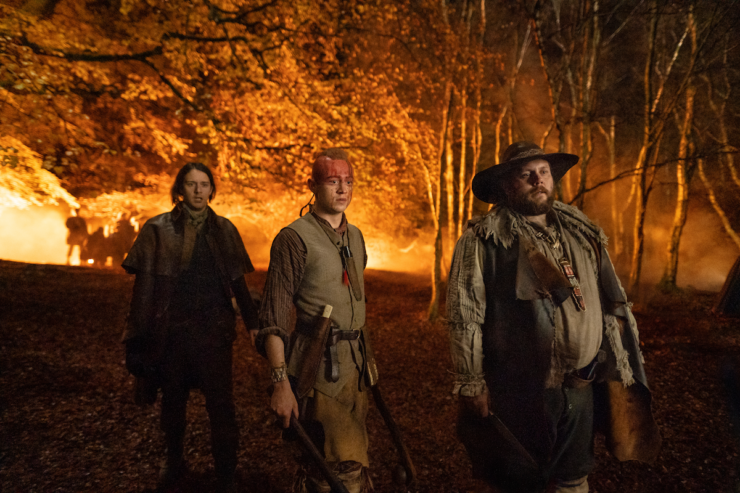
As with the many rapes in this series (both the books and TV adaptation), there is the question of whether it should have been transferred from page to screen. While it never stops being disturbing, and while I hate to see such a resilient heroine broken down this way, Claire’s rape feels like part of a larger conversation this season has established about the risks undertaken by time travelers living in the past—the price, beyond gemstones, that they must pay for their continued existence in a time that is not theirs.
Buy the Book
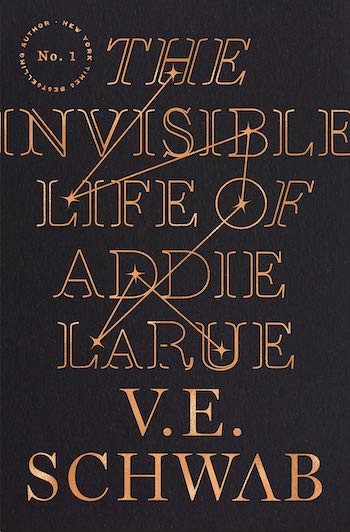

The Invisible Life of Addie LaRue
For Roger, it was forgetting the common sense guidelines for how to interact with other mens’ wives in the 18th century that got him hanged. It’s also worth noting that while he got an episode devoted to his months of rehabilitation, he almost entirely regained his ability to speak, whereas the Roger of the books has much more permanent vocal damage.
Weirdly enough, this season has adjusted my stance on Brianna’s rape plotline, which began last season with Bonnet assaulting her in a pub and ended this year with his death at her hands. Last year I was furious that the show carried out the plot from the book, in which Brianna becomes pregnant after losing her virginity to Roger in the same day that Bonnet rapes her, so that she had no way of knowing who the father was. That she kept the fetus, rather than accepting Claire’s offer to perform an abortion—albeit with the limited tools and heightened risks of the time—felt horribly reductive.
However, this season provided period-appropriate conflict in the form of Bonnet returning to claim Jemmy as his, after Jocasta signed over the deed to River Run in the boy’s name. Bonnet, with his ability to pay off “witnesses” who would attest to it being a consensual encounter, yet also cunning enough to know that the mere presence of a baby will sway things in his favor, saw this as an opportunity to move up in the world and become a proper gentleman in a way that none of his trade nor dealings would ever have afforded. Taking on Jemmy and Brianna as his unwitting family would have been an easy enough sacrifice.
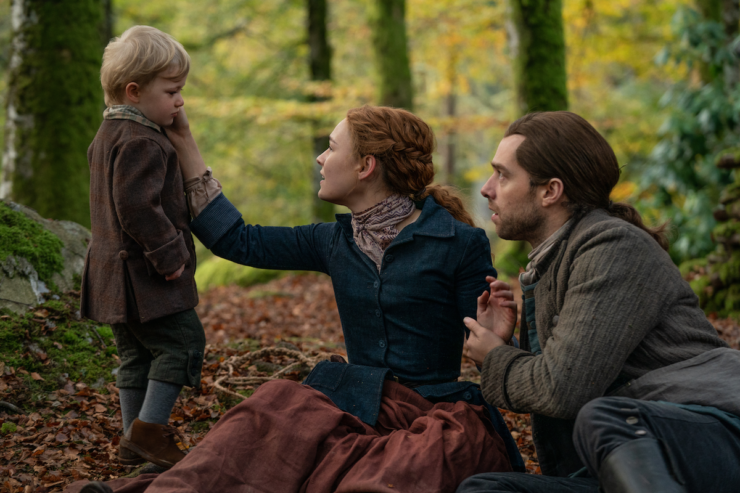
When that plot was still playing out, I was convinced that that would be the reason for the MacKenzies to return to the 1970s, that they would never be able to escape Bonnet’s paternity claims unless they literally did not exist in that time. It’s even a similar enough reason to why they travel back in the books, when their other child’s heart condition simply cannot be healed in the past.
But instead, the three go through the stones… only to be spat back out moments later, in front of a stunned Ian. Bree and Roger are equally shellshocked, but realize that they were both thinking of home, and, well—this must be it. Which raises the question of how “The Ballad of Roger Mac” gets written in the future, as we saw in the title card before 5×07; clearly Roger has some sort of impact on the past.
For the moment, their return oddly feels linked with Claire’s kidnapping and rape, like the latter was the price for Claire getting to spend the rest of her life with her daughter. Likely Claire herself would rail against this cosmic explanation, as she struggles in the aftermath to adhere to any sort of traditional narrative that takes away any of her agency. In an incredible monologue drawn almost verbatim from her words in A Breath of Snow and Ashes, she tells Jamie:
I have lived through a fucking world war. I lost a child, I lost two husbands, I’ve been starved with an army, I’ve been beaten, I’ve been betrayed, and I’ve been imprisoned… I’ve survived. And this—I am supposed to be shattered by this. But I won’t be.
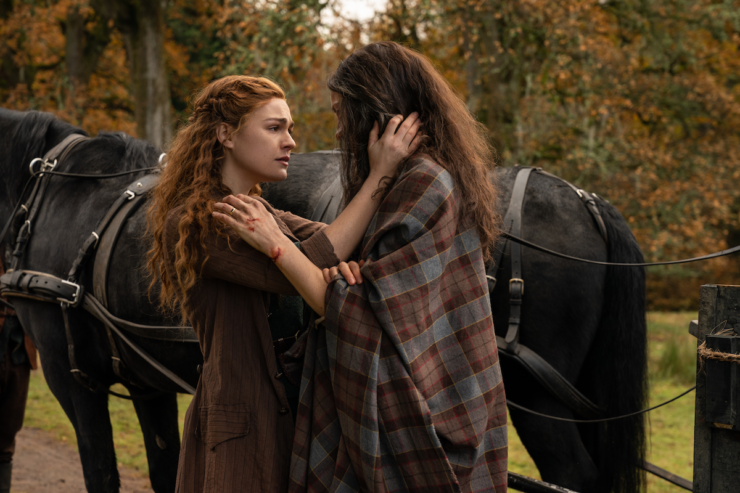
Brianna turns Bonnet in so that he can be properly sentenced to drowning, then shoots him in a mercy killing after he confessed his nightmares of being taken by the ocean. Claire has the chance to kill Lionel but holds fast to the Hippocratic Oath. Neither mother nor daughter accepts the role of helpless victim, of ruined woman. Neither shatters. It’s still a disturbing bond for them to share, but what’s most significant is how they react. I just hope next season can go on without a rape to further the plotline.
Speaking of badass women, Marsali takes care of Lionel, with a nice callback to the water hemlock root that Ian was ready to kill himself with. Hers has been my very favorite character development this season, as she has taken on duties as Claire’s medical assistant, and in doing so expanded her perspective beyond the constraints of her religious upbringing. Yet for her to still worry about going to hell for murder, to worry about Lionel haunting her for her wicked deed, is so affecting and true to the character.
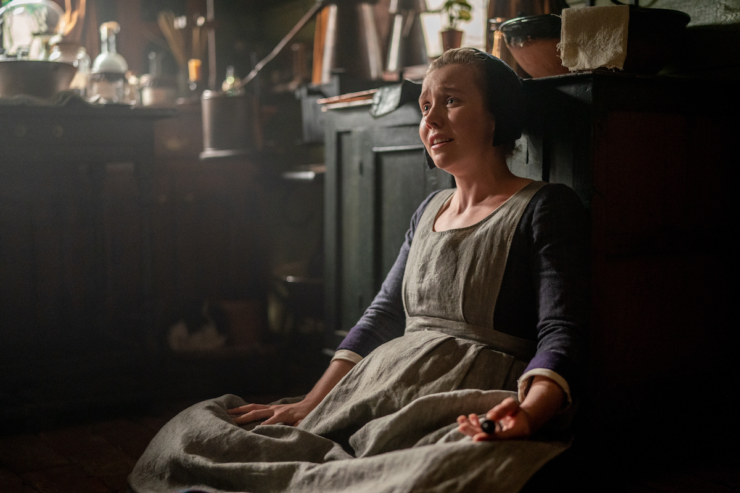
While Claire has the most powerful monologue of the episode, the season ends on Jamie quoting Thucydides: “The bravest are surely those who have the clearest vision of what is before them, glory and danger alike, and yet notwithstanding, go out to meet it.” It seems that none of the modern time travelers could quite anticipate the exact horrors they would encounter as strangers in a strange land: accused of witchcraft or possession, raped, being burned at the stake, hanged for a misunderstanding, raped, murdered by the very people you were trying to save, raped. But they know now, and they have only further committed to living in this time instead of returning to a comparatively easier time period.
It’s a grimmer, less exciting, ending than past seasons, but it strengthens the series mythology regarding these travelers. I hope that future seasons will continue to build on the struggle, and that this attack has not lessened Claire’s desire to help women in the past. After all, the laws of the universe didn’t punish her for sharing her modern knowledge; it was just one pathetic man, who soon got what he deserved.
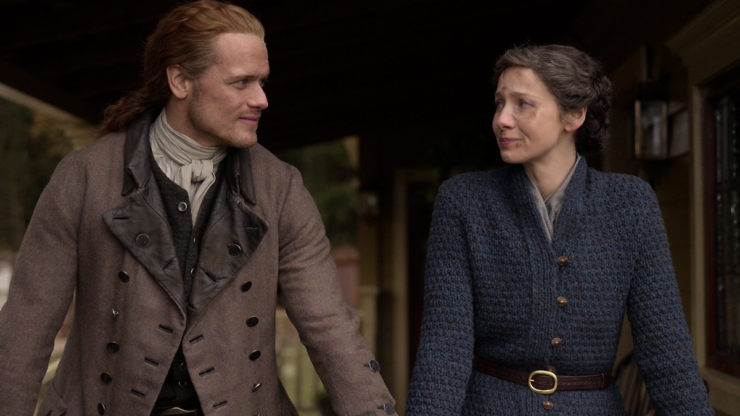
What did you think of the Outlander finale? What are your hopes for season 6 aside from, you know, the American Revolution?
Natalie Zutter is really wondering if they realized this episode would air on Mother’s Day. Theorize about Outlander season 6 with her on Twitter!










